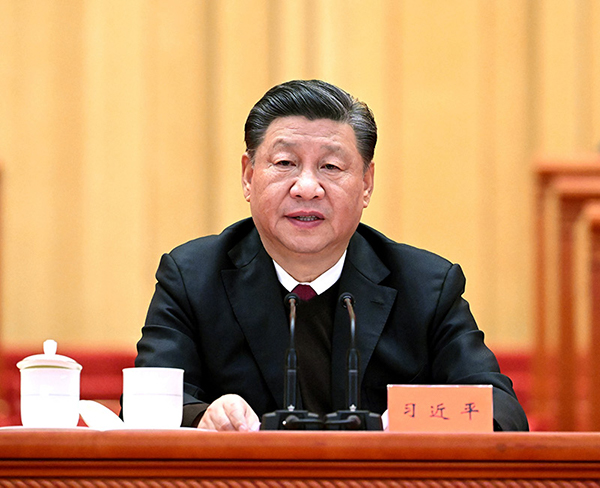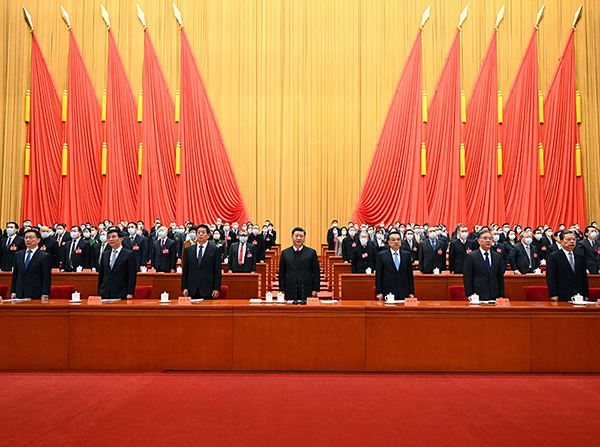BEIJING — President Xi Jinping called on Chinese artists and writers to boost their awareness of and confidence in Chinese culture, create new prospects for Chinese literature and art, and add new luster to Chinese culture.
Xi, also general secretary of the Communist Party of China (CPC) Central Committee and chairman of the Central Military Commission, made the remarks at the opening ceremony of the 11th National Congress of China Federation of Literary and Art Circles and the 10th National Congress of China Writers Association on Dec 14.
Over the past 100 years, the Party has led the literary and art front to blaze a path of development that is guided by Marxism, suited to China's national conditions and cultural traditions, and holds high the people-centered nature, Xi said.

Noting that contemporary China has great prospects, Xi said this era has provided an unprecedented broad stage for literature and art to bloom. He urged people of the sector to shoulder the responsibility to develop a great socialist culture in China, saying that they can accomplish a great deal.
Xi said those on the literary and art front should adhere to serving the people and socialism, follow the policy of "letting a hundred flowers bloom and a hundred schools of thought contend," push for creative transformation and development, and rise up to their tasks and missions.
All these efforts will help present a new look of China's literature and art and add new luster to Chinese culture, thus contributing to realizing the Chinese Dream of national rejuvenation, Xi added.
Also attending the meeting were Li Keqiang, Li Zhanshu, Wang Yang, Wang Huning, Zhao Leji, and Han Zheng, who are all members of the Standing Committee of the Political Bureau of the CPC Central Committee.

On behalf of the CPC Central Committee, Xi extended greetings to representatives at the meeting as well as all writers and artists across the country.
Since the 18th National Congress of the CPC in 2012, China's literature and art have been flourishing with great diversity and full vigor, Xi said, taking note of progress in the spheres of literature, drama, film, television, music, dance, fine arts, photography, calligraphy, folk art, acrobatics, literary criticism, mass art, and art education.
He expressed his hope that the writers and artists will bear in mind the national rejuvenation and the people, make innovations on the basis of tradition, better tell China's stories to the world, and stick to both moral integrity and artistic competence.
Xi pointed out that artists and writers should firmly grasp the contemporary theme of national rejuvenation and closely integrate the pursuit of their artistic life with the future of China, the destiny of the Chinese nation and the aspirations of the Chinese people.
Artists and writers must promote a national spirit that is based on patriotism and a contemporary spirit that is based on reform and innovation, Xi said.
He said the fundamental position of socialist literature and art is from the people, for the people and of the people. This is also the driving force for the prosperity of socialist literature and art, Xi added.
Xi said writers and artists should take a people-centered approach and produce more works that meet the people's cultural needs and enhance people's spiritual strength.
He said writers and artists should not only let the people play the lead in their works, but also integrate their ideological tendencies and emotions with the people.
Noting that the value of writers and artists is represented by their creations, Xi called on Chinese writers and artists to strengthen their efforts in producing high-quality literary and artistic works.
He urged blending the values of Chinese culture with artistic creativity and combining the Chinese and contemporary aesthetics to revitalize Chinese culture.
Regarding the relationship between inheritance and innovation, Xi said that fine traditional Chinese culture can become an important source of inspiration for literary and artistic innovation.
Stressing that contemporary Chinese literature and art should look beyond China, Xi called for producing literary and artistic works that convey modern Chinese values and notions and also reflect the common values and pursuits of all humanity.
He urged the creation of more globally recognizable cultural images of China that can help present a lively and multidimensional China for the world.
Xi highlighted the importance of preserving the stance of Chinese culture and establishing a distinctive Chinese style and demeanor in world literature and art.
Literature and art should be down-to-earth, centered around life, be innovative and pursue economic returns, but should not be vulgar, spread unhealthy influence, be grotesque or succumb to the market, Xi said.
Those working in literature and art should treasure their social influence, because if they misbehave, they will not be accepted by the people and will be against the times, he said, demanding that they nourish integrity and promote truthfulness, kindness and beauty, and speak against hypocrisy, villainy and ugliness.
Xi noted that to make socialist literature and art prosper, literature and art workers who are patriotic and eager to contribute should be widely united under the leadership of the Party.
He called for more guidance for new forms of literary and art organizations and groups, more support for grassroots literature and art workers, and more encouragement for the younger generation, so as to produce more contemporary Chinese writers and artists, and make the Chinese literature and art circle star-studded.
Around 3,000 people attended the meeting.